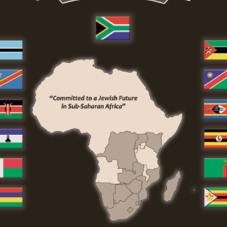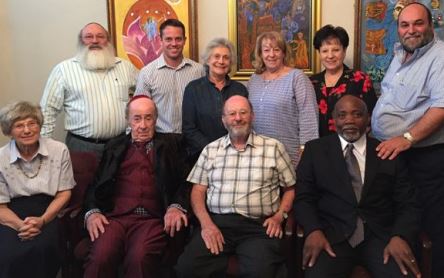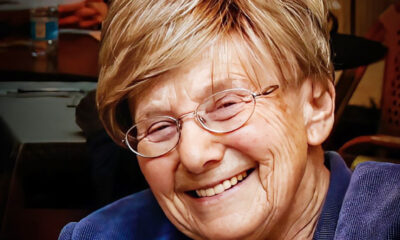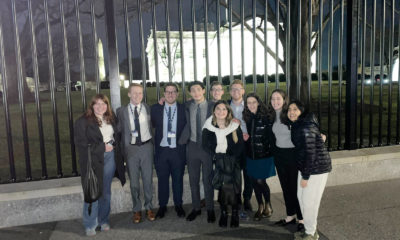
Banner

All the latest news on African Jewry
DAVID SAKS
Last Sunday, the executive committee of the African Jewish Congress (AJC) convened in Cape Town for its first meeting since the passing of its long-serving president, Mervyn Smith, in November.
Participants included representatives of South Africa, Namibia, Botswana, Swaziland and Zimbabwe. AJC spiritual leader and CEO, Rabbi Moshe Silberhaft, reported back on behalf of Mauritius, Kenya and AJC associate countries, including Madagascar and Uganda. Hermoine Sternberg presented the report from Mozambique.

RIGHT: Front: Ann Harris, acting president, AJC; Richard Lyons (Botswana), vice-president; Peter Sternberg (Zimbabwe), acting vice-president; Geoff Ramokgadi (Swaziland), vice-president. Back: Zvi Gorelick (Namibia); Michael Kushner, (CSO representative); Hermoine Stenberg (observe); Irene Zuckerman and Li Boiskin (executive members); and Rabbi Moshe Silberhaft, (CEO and spiritual leader)
Kenya is home to the second-largest sub-Saharan Jewish community, with some 600 in the capital, Nairobi, and another hundred in Mombasa. Rabbi Silberhaft reported that the community was fully functioning, despite not having a rabbi. In Zambia, however, community life had all but ceased. The Lusaka synagogue had been sold and the proceeds used to build a museum, establish a section in the Ndola Hospital and a section in the Tel Aviv Hospital, with Israeli medical students qualifying there being required to spend six months working in Zambia.
Mauritius had also recently commemorated its Jewish past, with the establishment of the Beau Bassin Jewish Detainees Memorial and Information Centre.
Namibia struggles to make minyan
Zimbabwe’s Jewish community has 180 members, roughly evenly divided between Harare and Bulawayo. Peter Sternberg noted that at its height in the 1960s, the community numbered 7 500. He said the future of the country remained bleak, with 90 per cent unemployment, water and electricity shortages and deteriorating public services. But anti-Semitism was virtually non-existent.
The representatives of Namibia, Botswana and Swaziland all reported declining levels of Jewish activity in their countries. Zvi Gorelick said that while about 100 Jews remained in Namibia, they were widely scattered, and the last remaining synagogue, in Windhoek, struggled to make a minyan.
One positive development had been the long-awaited appearance of a book on the history of the Jews of Namibia. This would be launched in Johannesburg and Cape Town on 10 March.
Swaziland largely inactive
Geoff Ramokgadi reported that the Jewish community in Swaziland, comprising 13 families, was divided and largely inactive, although its members came together for funerals and yahrtzeits.
Regarding Botswana, Richard Lyons said there was little interaction between the few permanent locals and Israeli short-term contract workers and it was rare to muster a Friday night minyan.
By contrast, Mozambique reported relatively high levels of Jewish activity, including regular Shabbat services. Interfaith relations were excellent and the community was represented on the Council of Religions in Mozambique.
Michael Kushner gave a security briefing, referencing the rise of threats posed by ISIS and other extremist movements. David Cranna spoke on the aims and ideology of the Heavenly Culture World Peace Restoration of Light.
Special guests at the meeting were David Cranna, Brandon Jung and Nancy Roussopoulos, representing the Heavenly Culture World Peace Restoration of Light (South Korea) and its sub-organisations, the International Peace Women’s Group and International Peace Youth Group.
Ann Harris was confirmed as acting AJC president until elections to be held at the next AGM in September. Outlining her vision for the future, she stressed that the countries affiliated to the AJC differed widely from one another in terms of such questions as security, access to government, religious observance and what people could and could not say.
She undertook to get from the various communities an indication of what they needed and what problems they faced, and table this for discussion at the AGM. She also reported back on her participation, as a representative of the AJC and of SA Jewry, at the ceremony held at Auschwitz on January 27, to mark the 70th anniversary of the liberation of the camp.











Iosef Moszenberg
January 30, 2017 at 4:10 pm
‘MUY INTERESANTE COMUNIDAD JUDIA’